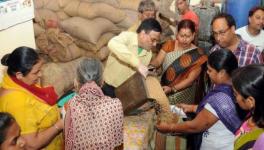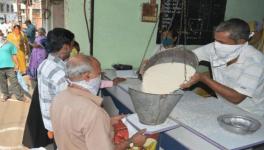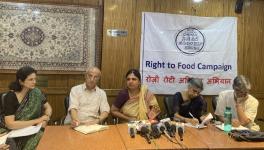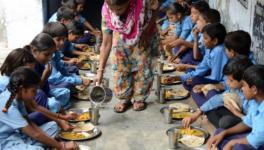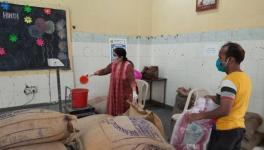Right to Food Campaign Opposes Distribution of Maneka Gandhi's ‘Nutrient Packets’
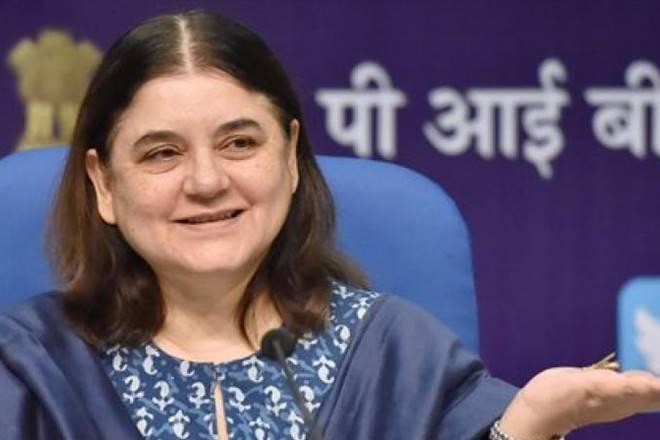
At Anganwadi centres across rural India, pregnant and lactating mothers and their children under three are given take-home rations — as supplementary nutrition, which is critical for preventing child and maternal mortality, child malnutrition, and stunted growth.
However, Union Women and Child Development (WCD) Minister Maneka Gandhi plans to replace these take-home rations with “energy-dense, factory-made nutrient packets”.
This is not only unhealthy in the long term — because factory-made nutrient packets count as ultra-processed food, depriving children of the wholesomeness and diversity of cooked meals — but will make way for profit-seeking private contractors to take over supplementary nutrition, say activists.
Opposing the move, the Right To Food Campaign (RTFC) has written a letter to the WCD minister, which has been endorsed by nearly 200 individuals and networks.
“Children need adequate quantities of wholesome, diverse foods to grow and develop. These foods should meet their requirements of various nutrients, as well as calories. Lack of enough food, especially diverse food, means that children are unable to meet their nutritional requirements,” says the letter.
The supplementary nutrition programme (SNP) under the Integrated Child Development Services (ICDS) scheme plays an important role in combatting child malnutrition. Apart from the provision of take-home rations, children between three and six years of age are given hot-cooked meals.
“As shown by NFHS-4 data, less than 10% of children under two years in our country are currently receiving adequate diet, highlighting the urgent need to take measures to ensure dietary diversity and appropriate care and feeding for young children. Introducing nutrient packets would take us away from the objective of moving towards dietary diversity,” the letter says.
“In the context of increasing burden of non-communicable diseases in India, experts have been warning us against excessive use of processed and ultra-processed foods.”
Moreover, the RTFC has warned that such a move would open doors for private contractors and suppliers to take control over what is currently provided in Anganwadis in a decentralised manner — and would result in inferior quality, as experience in nearly every state has shown.
“For years, the Right to Food Campaign has been fighting the battle against the role of private contractors in the supply of supplementary nutrition in the ICDS,” the letter says.
“In state after state, it has been seen that the unholy nexus between the contractors and politicians/bureaucrats result in central contracts worth hundreds of crores for the supply of food to ICDS. The quality of food supplied to the centres is compromised while companies make profits from the meagre allocation on supplementary nutrition.”
The letter also refers to the recent scams that came to light in Maharashtra, Madhya Pradesh and Uttar Pradesh.
On the other hand, the supply of food to Anganwadis at a decentralised local level “provides the opportunity to create employment for local women as well as demand for local products such as vegetables, eggs, etc. All of this is possible only when the food is produced and distributed in a decentralised manner,” the letter says.
Speaking to Newsclick, Dipa Sinha of the Right To Food Campaign said, “Providing processed nutrient packets to children who are not sick amounts to the medicalisation of food and is unsustainable. The point is to provide a balanced, diverse and good-quality diet to children to ensure they are not malnourished. Look at middle-class households. Are children given nutrient packets instead of healthy meals to combat malnutrition?”
She said the provision of these “factory-made” nutrient packets will lead to centralised commercial production and distribution, which is a hotbed of corruption.
In 2004, there was a Supreme Court order that private contractors should not be involved in ICDS, but they continue to rule the roost in most states, Sinha said.
“We have seen what has happened in states like Maharashtra and Uttar Pradesh. The National Human Rights Commission in its report revealed the massive corruption and substandard quality of food supplied to Anganwadis in UP, where the company owned by the family of Ponty Chadha holds the contract. In Maharashtra, three fake Mahila Mandals were put up as a front by the private companies and were given contracts. This was exposed in reports by SC commissioners,” said Sinha.
“This move will only lead to further centralisation of corruption,” she added.
As the letter says, “large, global and national food corporations see children’s hunger and malnourishment as a source of profits and are trying to influence government policy towards providing packaged foods.”
Besides, the provision of take-home rations and hot cooked meals serve the purpose of spreading awareness about a healthy diet and the importance of various nutrients in food — called the “demonstration effect” — which is crucial for economically and socially marginalised families in rural areas, said Sinha.
Get the latest reports & analysis with people's perspective on Protests, movements & deep analytical videos, discussions of the current affairs in your Telegram app. Subscribe to NewsClick's Telegram channel & get Real-Time updates on stories, as they get published on our website.









